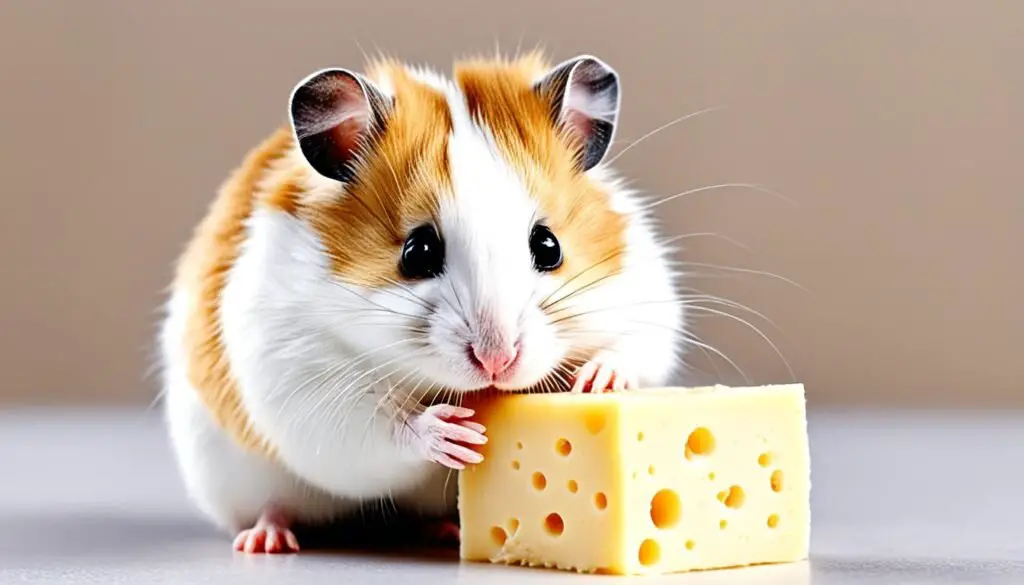Imagine this: you’re sitting on your couch, enjoying a cozy evening with your furry little companion, your pet hamster. As you munch on a delicious piece of cheese, your hamster stares at you with those adorable, beady eyes, clearly longing to have a taste. You can’t help but wonder: can hamsters eat cheese?
Well, the answer is not quite straightforward. While cheese may be enticing to our taste buds, it’s important to consider the safety and nutritional needs of our adorable hamster friends.
Are All Cheeses Safe for Hamsters?
When it comes to feeding your hamster cheese, not all options are safe for them. While cheese itself is not toxic to hamsters, excessive consumption can lead to health problems. It’s crucial to choose the right types of cheese that are low in fat and salt to minimize the risks. Opt for cheeses like low-fat cottage cheese or mozzarella, which are safer options for your furry friend. It’s important to avoid aged cheddar, parmesan, and processed cheese products, as they can be harmful to hamsters due to their higher fat and salt content. Additionally, moldy cheeses such as Stilton or blue cheese should be strictly avoided.
Monitoring Your Hamster’s Tolerance
Even with safe cheese options, it’s crucial to observe how your hamster tolerates it. Every hamster is different, and their digestive systems may react differently to certain foods. Start by offering small amounts of cheese as an occasional treat and assess whether your hamster shows any signs of discomfort or intolerance. If you notice any digestive issues like vomiting or diarrhea, it’s best to discontinue feeding cheese to your hamster altogether.
Remember, cheese is not an essential part of a hamster’s diet, and their nutritional needs are primarily met through commercial hamster food and fresh vegetables. Cheese should only be given in moderation and as a special treat, separate from their regular meals.
The Nutritional Components of Cheese
When considering what kind of cheese to feed your hamster, it is important to consider the nutritional components. Cheese contains fat, salt, and protein. While there is no “best” cheese for hamsters, some cheeses have a better ratio of salt-to-fat.
Mozzarella, string cheese, and soft goat cheese are considered healthier options for hamsters. These cheeses are lower in fat and salt compared to other varieties. They provide a good source of protein for your hamster’s diet.
Another option is cottage cheese, which is high in salt but can be suitable for pregnant hamsters due to its high calcium and protein content. However, it should still be given in moderation.
Remember, cheese should be fed as a treat and not a staple in your hamster’s diet. It is important to offer a variety of foods to ensure your hamster gets all the necessary nutrients.

How Much Cheese Can Hamsters Have?
When it comes to feeding cheese to your hamster, moderation is key. Hamsters should have a maximum of ¼ ounce of cheese once a week. This small portion ensures that they receive a treat without consuming excessive fat and salt. To make the cheese easier to eat, it is recommended to cut it into small, bite-sized pieces. This helps prevent choking and ensures your hamster can safely enjoy their snack.
If your hamster doesn’t finish all the cheese you’ve given them, it’s important to remove any uneaten portions from their cage. Leaving the cheese in the cage can lead to molding and create a health hazard for your furry friend. By maintaining a clean and hygienic environment, you can keep your hamster healthy and happy.
While offering cheese as a treat can be a bonding experience with your hamster, it’s important to note that it should be separate from their regular food. Cheese should be given sparingly, complementing their balanced commercial hamster diet. Remember, cheese is high in fat and salt, so it’s essential to limit their intake to prevent any potential health issues.
Considerations and Precautions
When it comes to feeding cheese to your hamster, it’s important to consider their specific needs. While some hamsters may tolerate cheese well, others may experience lactose intolerance. Keep an eye out for signs of intolerance such as vomiting and diarrhea. If you notice any of these symptoms, it’s best to avoid feeding cheese to your hamster.
Another important consideration is the risk of hamsters becoming overweight if given too much cheese. Cheese is high in fat and can contribute to weight gain. Additionally, the high salt content in cheese can lead to dehydration and kidney problems in hamsters. To avoid these issues, it’s crucial to offer cheese in moderation and monitor your hamster’s overall health and weight.
If you’re unsure about feeding cheese to your hamster or have any concerns, it’s always a good idea to consult with an exotic veterinarian. They can provide guidance specific to your hamster’s needs and help you make informed decisions regarding their diet and well-being. Your hamster’s health and safety should always be the top priority when considering cheese options for your pet.
